
Gioachino Antonio Rossini was an Italian composer who gained fame for his 39 operas, although he also wrote many songs, some chamber music and piano pieces, and some sacred music. He set new standards for both comic and serious opera before retiring from large-scale composition while still in his thirties, at the height of his popularity.
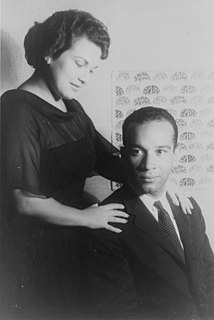
Marilyn Horne is an American mezzo-soprano opera singer. She specialized in roles requiring beauty of tone, excellent breath support, and the ability to execute difficult coloratura passages. She is a recipient of the National Medal of Arts, the Kennedy Center Honors, and has won four Grammy Awards.
Samuel Edward Ramey is an American operatic bass.
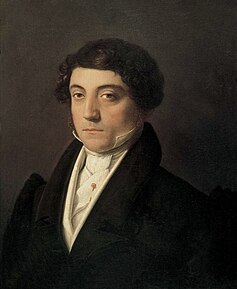
La gazza ladra is a melodramma or opera semiseria in two acts by Gioachino Rossini, with a libretto by Giovanni Gherardini based on La pie voleuse by Théodore Baudouin d'Aubigny and Louis-Charles Caigniez. The Thieving Magpie is best known for the overture, which is musically notable for its use of snare drums. The unique inspiration in the melodies is extreme, famously used to bizarre and dramatic effect in Stanley Kubrick's A Clockwork Orange. It was referenced by Haruki Murakami in his work The Wind-Up Bird Chronicle. This memorable section in Rossini's overture evokes the image of the opera's main subject: a devilishly clever, thieving magpie.
June Anderson is a Grammy Award-winning American dramatic coloratura soprano. Originally known for bel canto performances of Rossini, Donizetti, and Vincenzo Bellini, she was the first non-Italian ever to win the prestigious Bellini d'Oro prize.

The Messa per Rossini is a Requiem Mass composed to commemorate the first anniversary of Gioachino Rossini's death. It was a collaboration among 13 Italian composers, initiated by Giuseppe Verdi. The composition was intended to be performed on 13 November 1869 in the Basilica of San Petronio, Bologna, where Rossini grew up and spent a large part of his life.

Gianluigi Gelmetti OMRI, is an Italian-born, naturalized Monaco citizen conductor and composer.
Deborah Voigt is an American dramatic soprano who has sung roles in operas by Wagner and Richard Strauss.

La donna del lago is an opera composed by Gioachino Rossini with a libretto by Andrea Leone Tottola based on the French translation of The Lady of the Lake, a narrative poem written in 1810 by Sir Walter Scott, whose work continued to popularize the image of the romantic highlands. Scott's basic story has been noted as coming from "the hint of an incident stemming from the frequent custom of James V, the King of Scotland, of walking through the kingdom in disguise".

Ermione (1819) is a tragic opera in two acts by Gioachino Rossini to an Italian libretto by Andrea Leone Tottola, based on the play Andromaque by Jean Racine.

Bianca e Falliero, ossia Il consiglio dei tre is a two-act operatic melodramma by Gioachino Rossini to an Italian libretto by Felice Romani. The libretto was based on Antoine-Vincent Arnault's play Les Vénitiens, ou Blanche et Montcassin.

Stabat Mater is a work by Gioachino Rossini based on the traditional structure of the Stabat Mater sequence for chorus and soloists. Initially he used his own librettos and compositions for a portion of the work and, eventually, the remainder by Giovanni Tadolini, who composed six additional movements. Rossini presented the completed work to Varela as his own. It was composed late in his career after retiring from the composition of opera. He began the work in 1831 but did not complete it until 1841.

Robert Bruce is an 1846 pastiche opera in three acts, with music by Gioachino Rossini and Louis Niedermeyer to a French-language libretto by Alphonse Royer and Gustave Vaëz, after Walter Scott's History of Scotland. The music was stitched together by Niedermeyer, with the composer's permission, with pieces from La donna del lago, Zelmira, and other Rossini operas. The work was premiered on 30 December 1846, by the Paris Opera at the Salle Le Peletier. The audience may not have noticed, but the orchestra included for the first time a recently invented instrument, which later came to be known as the saxophone.
Christine Weidinger is an American operatic soprano who has had an active international career in operas and concerts since the early 1970s. Her career started at the Metropolitan Opera, after which she was active as a resident artist with opera houses in Germany during the late 1970s and 1980s. From the 1970s through the 1990s she worked as a guest artist with many leading opera houses throughout Europe, South America, and the United States.
Gloria Banditelli is an Italian mezzo-soprano. She debuted in La Cenerentola in Spoleto in 1979. She is well known both for late-classical early-bel canto era roles of Rossini, Cimarosa and Paisiello, and also baroque opera, such as Monteverdi and Cavalli.
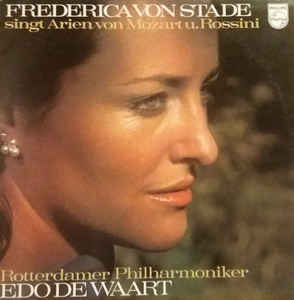
Frederica von Stade sings Mozart & Rossini Arias is a 52-minute studio album of operatic arias performed by von Stade and the Rotterdam Philharmonic Orchestra under the direction of Edo de Waart. It was released in 1976. A second, 69-minute version of the album, Frederica von Stade: Haydn, Mozart & Rossini Arias, released by Philips on CD, adds bonus tracks derived from von Stade's contributions to Antal Doráti's recordings of Joseph Haydn's operas La fedeltà premiata and Il mondo della luna. A third, 52-minute version released on SACD by PentaTone in 2005 reverts to the contents of the first version, but presents the music in quadraphonic surround sound.
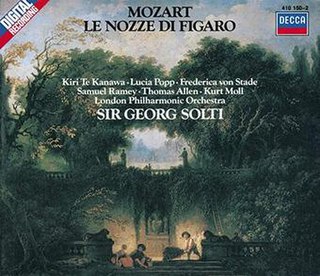
Le nozze di Figaro is a 168-minute studio recording of Wolfgang Amadeus Mozart's opera, performed by a cast of singers headed by Sir Thomas Allen, Lucia Popp, Samuel Ramey, Frederica von Stade, Kurt Moll and Dame Kiri Te Kanawa with the London Philharmonic Orchestra under the direction of Sir Georg Solti. It was released in 1982.
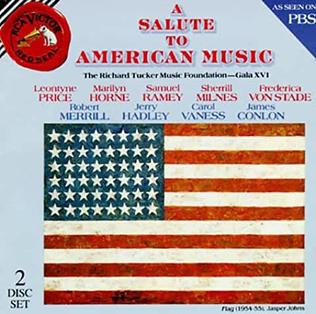
A Salute to American Music is a 113-minute live album of music, both classical and popular, performed by Steven Blier, Renée Fleming, Paul Groves, Jerry Hadley, Karen Holvik, Marilyn Horne, Jeff Mattsey, Robert Merrill, Sherrill Milnes, Maureen O'Flynn, Phyllis Pancella, Leontyne Price, Samuel Ramey, Daniel Smith, Frederica von Stade, Tatiana Troyanos, Carol Vaness and Denise Woods with the Collegiate Chorale and members of the Metropolitan Opera Orchestra under the direction of James Conlon. The album was released in 1992.

The Metropolitan Opera Centennial Gala was a televised concert, lasting more than eight hours, that New York City's Metropolitan Opera staged on 22 October 1983 to commemorate the hundredth anniversary of its first performance. A 230-minute selection of excerpts from the concert was first released in 1985 on a pair of Pioneer Artists Laserdiscs, subsequently appearing on a pair of Bel Canto Paramount Home Video VHS videocassettes in 1989 and on a Pioneer Classics DVD in 1998. A remastered double DVD of the film was issued by Deutsche Grammophon in 2009.

James Levine's 25th Anniversary Metropolitan Opera Gala was a concert, lasting approximately eight hours, that the Metropolitan Opera staged in 1996 in honour of its then principal conductor and Artistic Director. Excerpts from the gala were released by Deutsche Grammophon on a 72-minute CD, a 161-minute VHS videocassette and a 161-minute double Laserdisc in 1996, and on a 293-minute double DVD in 2005.














